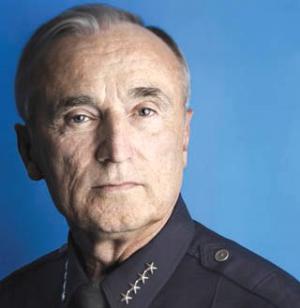Bill Bratton misses the point on prohibition and violence, Nebraskans will have to wait for medical marijuana, Fentanyl is displacing heroin in Vancouver, and more.

New York City's Top Cop Blames Marijuana Legalization -- Not Prohibition -- for Black Market Violence. NYPD Commissioner Bill Bratton Sunday criticized states that have legalized weed because there is violence around the black market in his city, which hasn't legalized weed. "Here in New York, the violence we see associated with drugs, the vast majority of it, is around the issue of marijuana, which is ironic considering the explosion in use of heroin now in the city," Bratton said. "Interestingly enough, here in New York City most of the violence we see -- violence around drug trafficking -- is involving marijuana and I have to scratch my head as we are seeing many states wanting to legalize marijuana, and more liberalization of policies."
Medical Marijuana
No Medical Marijuana Initiative for Nebraska This Year. Cornhusker medical marijuana advocates have decided to delay a petition drive to get the issue on the ballot until 2018. They cited the late start this year and the expense involved.
Rhode Island Senate Approves Adding PTSD to List of Qualifying Conditions. The Senate last Friday unanimously approved a bill that will add PTSD to the list of debilitating medical conditions that qualify a patient for medical marijuana. The bill now heads to the House.
Heroin and Prescription Opioids
Opioid Prescriptions are Falling for the First Time in 20 Years. Two reports from health information providers show that opioid prescriptions have declined in recent years. IMS Health reported a 12% decline in opioid prescriptions nationally since 2012, while Symphony Health Solutions reported an 18% drop during those years. IMS said prescriptions have fallen in 49 states, with only South Dakota showing an increase. The figures could have implications not only for overdose and addiction rates, but also for pain patients. "The climate has definitely shifted," said Dr. Daniel B. Carr, the director of Tufts Medical School's program on pain research education and policy. "It is now one of reluctance, fear of consequences and encumbrance with administrative hurdles. A lot of patients who are appropriate candidates for opioids have been caught up in that response."
International
In Vancouver, Heroin Has Been Displaced by Fentanyl. The synthetic opioid has been identified in half of all drug overdoses in the city this year, which is on track to exceed last year's drug overdose toll. Advocates for drug users in the city's Downtown East Side say there's no more heroin on the street after it has been pushed out by the cheaper and more potent Fentanyl. "Traditionally, heroin comes in about four different colors,"said the longtime drug advocate Hugh Lampkin of the Vancouver Area Network of Drug Users, describing a bland palette of beiges, browns and blacks. "Well now you're seeing multiple colors, like colors of the rainbow: green and pink and orange and white... Right away, when you see these colors that's a pretty good indicator that it's fentanyl that you're doing. The people who are controlling the supply, they're passing off what should be heroin as fentanyl because of the close proximity of the high."
Afghans Celebrate Bumper Opium Harvest. Hundreds of laborers from across the Pashtun heartland gathered in Naqil, Uruzgan province, to harvest a bumper crop of opium poppies and celebrate with after-work games in a festival-like atmosphere. "This is the only time of the year to make money," said Afzal Mohammad, who came all the way from Kandahar, standing amid chest-high poppy stalks nearby. "People work here for about 15 days and then are jobless for the rest of the year."
This work by StoptheDrugWar.org is licensed under Creative Commons Attribution-ShareAlike 4.0 International
Comments
The anti-cannabis
The anti-cannabis legalization sentiment among some law enforcement personnel (police, district attorneys, etc) is not surprising. When asked why so many police organizations are lobbying against marijuana law reform, retired Los Angeles Police Department Deputy Chief Stephen Downing said: "It's money. In many states, the city government expects police to make seizures, and they expect these seizures to supplement their budgets." "The only difference now compared to the times of alcohol prohibition is that, in the times of alcohol prohibition, law enforcement—the police and judges—got their money in brown paper bags. Today, they get their money through legitimate, systematic programs run by the federal government. That's why they’re using their lobbying organizations to fight every reform." Legalizing cannabis would greatly cut into their income, be it from cash seizures, asset forfeitures, federal grants, etc. It would also take away a common excuse to do a warrantless search. Many cops try to justify their anti-cannabis stance by falling for the rampant, unfounded anti-cannabis propaganda that continues to plague this nation. If you would like to hear what honest, knowledgeable, reasonable cops have to say about the drug war in general, please visit: LEAP - Law Enforcement Against Prohibition - http://www.leap.cc/ - 'Cops Say Legalize' "LEAP envisions a world in which drug policies work for the benefit of society and keep our communities safer. A system of legalization and regulation will end the violence, better protect human rights, safeguard our children, reduce crime and disease, treat drug abusers as patients, reduce addiction, use tax dollars more efficiently, and restore the public’s respect and trust in law enforcement." "LEAP’s goals are: (1) To educate the public, the media and policy makers about the failure of current drug policy by presenting a true picture of the history, causes and effects of drug use and the elevated crime rates more properly related to drug prohibition than to drug pharmacology and (2) To restore the public’s respect for police, which has been greatly diminished by law enforcements involvement in imposing drug prohibition."
Bill Bratton STFU
Add new comment